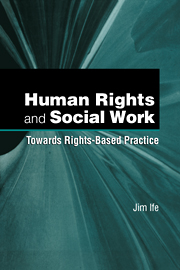Book contents
- Frontmatter
- Contents
- Acknowledgements
- Introduction
- 1 Human Rights in a Globalised World
- 2 The Three Generations of Human Rights
- 3 Public and Private Human Rights
- 4 Culture and Human Rights
- 5 Human Rights and Human Needs
- 6 Human Rights and Obligations
- 7 Ethics and Human Rights
- 8 Participation in the Human Rights Discourse
- 9 Constructing Human Rights for Social Work Practice
- 10 Achieving Human Rights through Social Work Practice
- 11 Respecting Human Rights in Social Work Practice
- 12 Conclusion: Prospects for Human Rights Practice
- Appendix I The Universal Declaration of Human Rights
- Appendix II Other Human Rights Declarations, Treaties and Conventions
- References
- Index
8 - Participation in the Human Rights Discourse
Published online by Cambridge University Press: 05 June 2012
- Frontmatter
- Contents
- Acknowledgements
- Introduction
- 1 Human Rights in a Globalised World
- 2 The Three Generations of Human Rights
- 3 Public and Private Human Rights
- 4 Culture and Human Rights
- 5 Human Rights and Human Needs
- 6 Human Rights and Obligations
- 7 Ethics and Human Rights
- 8 Participation in the Human Rights Discourse
- 9 Constructing Human Rights for Social Work Practice
- 10 Achieving Human Rights through Social Work Practice
- 11 Respecting Human Rights in Social Work Practice
- 12 Conclusion: Prospects for Human Rights Practice
- Appendix I The Universal Declaration of Human Rights
- Appendix II Other Human Rights Declarations, Treaties and Conventions
- References
- Index
Summary
The discursive view of human rights, emphasised throughout this book, suggests that human rights must be understood as an ongoing and ever-changing discourse about what it means to be human and about what should comprise the rights of common global citizenship. If this is the case, it is most important to examine the nature of that global dialogue. Who is responsible for maintaining that discourse, who contributes, who does not, and whose voices are the most powerful in defining what is to count as ‘human rights’?
As discussed in Chapter 1, one of the consequences of globalisation has been localisation, and this has led to the identification of the global and the local as the sites of significant change and praxis. For this reason the discussion in this chapter will be divided into a consideration of global and local dialogues around human rights.
The global discourse of human rights
While not wanting to underemphasise the disproportionate role that western voices have had in framing the human rights discourse, it is also clear that this concern is now being vigorously addressed. Even a cursory glance at the human rights literature shows that the issue of cultural relativism and the western domination of the discourse has received substantial attention and that a significant number of non-western writers are now talking about human rights (Schmale 1993; Aziz 1999; Bauer & Bell 1999; Parekh, B. 1999; Van Ness 1999).
- Type
- Chapter
- Information
- Human Rights and Social WorkTowards Rights-Based Practice, pp. 117 - 131Publisher: Cambridge University PressPrint publication year: 2001



